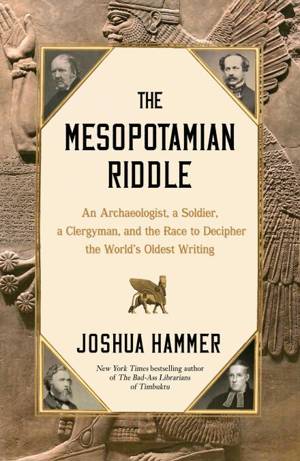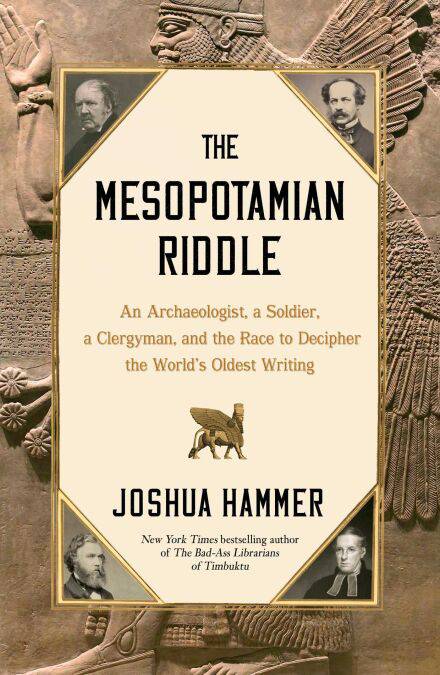
- Retrait gratuit dans votre magasin Club
- 7.000.000 titres dans notre catalogue
- Payer en toute sécurité
- Toujours un magasin près de chez vous
- Retrait gratuit dans votre magasin Club
- 7.000.0000 titres dans notre catalogue
- Payer en toute sécurité
- Toujours un magasin près de chez vous
The Mesopotamian Riddle EBOOK
An Archaeologist, a Soldier, a Clergyman, and the Race to Decipher the World's Oldest Writing
Joshua Hammer
Ebook | Anglais
16,76 €
+ 16 points
Format
Description
An “adventure tale for puzzle lovers and Indiana Jones fans alike” (The Washington Post) following three free-spirited Victorians on their twenty-year quest to decipher cuneiform, the oldest writing in the world—from the New York Times bestselling author of The Bad-Ass Librarians of Timbuktu.
It was one of history’s great vanishing acts. Around 3,400 BCE, a scribe in the mud-walled city-state of Uruk picked up a reed stylus to press tiny symbols into clay. For the next three thousand years, wedge-shape cuneiform script would record the military conquests, scientific discoveries, and epic literature of the great kingdoms of Mesopotamia. And then…the meaning of the characters was lost.
London, 1857. In an era obsessed with human progress, mysterious palaces emerging from the desert sands have captured the Victorian public’s imagination. Assyria, Babylon, the mighty Persian Empire… these civilizations had gone down in the annals as the great antagonists to ancient Greece and ancient Israel. What did these “bad guys” of Western history have to say for themselves? What were their values, their rituals, their understandings of their place in the universe? What was it like simply to be human at the dawn of recorded history?
Enter a swashbuckling archaeologist, a suave military officer turned diplomat, and a cloistered Irish rector, all vying for glory in a race to decipher the script that would enable humans to peer farther back into our history than ever before. From the ruins of Persepolis to lawless outposts of the crumbling Ottoman Empire, let The Mesopotamian Riddle whisk you off on “an epic intellectual adventure” (The Wall Street Journal) through the golden age of archaeology in an epic quest to understand where we came from—and where we perhaps might go.
It was one of history’s great vanishing acts. Around 3,400 BCE, a scribe in the mud-walled city-state of Uruk picked up a reed stylus to press tiny symbols into clay. For the next three thousand years, wedge-shape cuneiform script would record the military conquests, scientific discoveries, and epic literature of the great kingdoms of Mesopotamia. And then…the meaning of the characters was lost.
London, 1857. In an era obsessed with human progress, mysterious palaces emerging from the desert sands have captured the Victorian public’s imagination. Assyria, Babylon, the mighty Persian Empire… these civilizations had gone down in the annals as the great antagonists to ancient Greece and ancient Israel. What did these “bad guys” of Western history have to say for themselves? What were their values, their rituals, their understandings of their place in the universe? What was it like simply to be human at the dawn of recorded history?
Enter a swashbuckling archaeologist, a suave military officer turned diplomat, and a cloistered Irish rector, all vying for glory in a race to decipher the script that would enable humans to peer farther back into our history than ever before. From the ruins of Persepolis to lawless outposts of the crumbling Ottoman Empire, let The Mesopotamian Riddle whisk you off on “an epic intellectual adventure” (The Wall Street Journal) through the golden age of archaeology in an epic quest to understand where we came from—and where we perhaps might go.
Spécifications
Parties prenantes
- Auteur(s) :
- Editeur:
Contenu
- Nombre de pages :
- 400
- Langue:
- Anglais
Caractéristiques
- EAN:
- 9781668015469
- Date de parution :
- 17-03-25
- Format:
- Ebook
- Protection digitale:
- Adobe DRM
- Format numérique:
- ePub

Les avis
Nous publions uniquement les avis qui respectent les conditions requises. Consultez nos conditions pour les avis.






